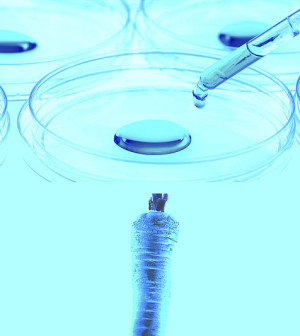- Could Your Grocery Store Meat Be Causing Recurring UTIs?
- Are You Making This Expensive Thermostat Error This Winter?
- Recognizing the Signs of Hypothyroidism
- 10 Strategies to Overcome Insomnia
- Could Artificial Sweeteners Be Aging the Brain Faster?
- Techniques for Soothing Your Nervous System
- Does the Water in Your House Smell Funny? Here’s Why
- Can a Daily Dose of Apple Cider Vinegar Actually Aid Weight Loss?
- 6 Health Beverages That Can Actually Spike Your Blood Sugar
- Treatment Options for Social Anxiety Disorder
Scientists Spot 15 Regions of Human DNA Linked to Depression

Researchers say they’ve identified 15 regions of human DNA associated with depression.
These regions may contain genes that increase the risk of depression, said the researchers, although the study does not prove these genes cause depression.
“Identifying genes that affect risk for a disease is a first step towards understanding the disease biology itself, which gives us targets to aim for in developing new treatments,” said corresponding study author Dr. Roy Perlis. He’s with the Center for Human Genetic Research at Massachusetts General Hospital in Boston.
“More generally, finding genes associated with depression should help make clear that this is a brain disease, which we hope will decrease the stigma still associated with these kinds of illnesses,” he said in a hospital news release.
The researchers analyzed data from more than 300,000 people of European ancestry that was collected by the consumer genetic profiling company 23andMe. More than 75,000 of the people in the study had been diagnosed with or treated for depression.
The analysis pinpointed 15 regions of DNA, including 17 specific sites, significantly associated with depression risk. Several of these sites are located in or near genes known to be involved in brain development.
“The neurotransmitter-based models we are currently using to treat depression are more than 40 years old, and we really need new treatment targets. We hope that finding these genes will point us toward novel treatment strategies,” said Perlis, who is also an associate professor of psychiatry at Harvard Medical School.
“Another key takeaway from our study is that the traditional way of doing genetic studies is not the only way that works. Using existing large data sets or biobanks may be far more efficient and may be helpful for other psychiatric disorders, such as anxiety disorders, where traditional approaches also have not been successful,” Perlis said.
The study was published online Aug. 1 in the journal Nature Genetics.
More information
The U.S. National Institute of Mental Health has more on depression.
Source: HealthDay
Copyright © 2026 HealthDay. All rights reserved.










